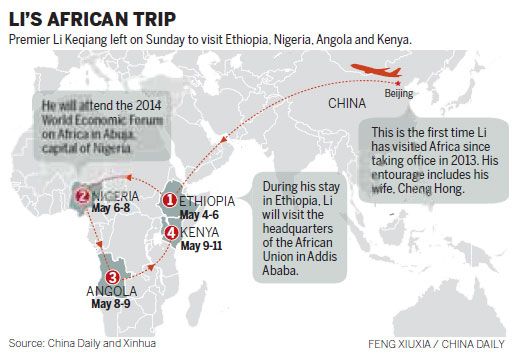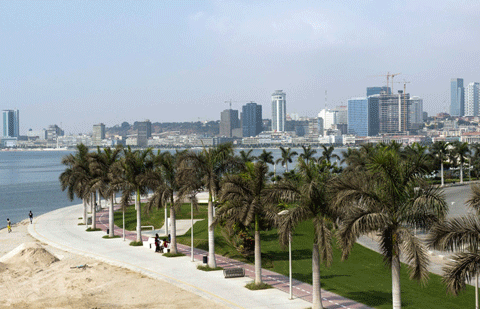
Deal signed to upgrade roads, grid in Ethiopia
Updated: 2014-05-05 01:31
By ZHAO YINAN and LI LIANXING in Addis Ababa (China Daily)
Comments Print Mail Large Medium SmallVisiting premier reaffirms Beijing's Africa commitment
Infrastructure in Ethiopia is expected to get a boost as China vowed on Sunday to help upgrade the nation's power grid and road system.
|
 |
|
Premier Li Keqiang and his wife Cheng Hong arrive in Addis Ababa, Ethiopia, on Sunday. [Photo/Xinhua] |
The pledge was part of a raft of deals signed by the two countries on Sunday afternoon, hours after Premier Li Keqiang arrived at the Ethiopian capital of Addis Ababa.
Under the deals, China will assist the Ethiopian government in renewing roads in its capital and offer loans to upgrade the local power grid and an intercity road construction project.
 |
| Special coverage |
They also reached agreements in agriculture, industrialization and other sectors closely related to both countries' development.
China has already funded Ethiopia's first expressway project and is building a light-rail transit system in Addis Ababa. The $475 million project being executed by China Railway Engineering Corp is scheduled to carry passengers next year on a trial basis.
Ethiopia is the first leg of Li's eight-day visit to Africa, his first trip there since taking office in 2013. His entourage includes his wife, Cheng Hong.
While in Ethiopia, Li will visit the headquarters of the African Union in Addis Ababa and meet its chairwoman, Nkosazana Dlamini Zuma. Li is expected to deliver a speech on China's Africa policy and reaffirm Beijing's commitment to deepening the China-Africa strategic partnership.
|
 |
"I am looking forward to an in-depth exchange of views on bilateral issues and issues of common concern with Ethiopian and AU leaders, and I am ready to promote further development of relations and cooperation between China and Ethiopia as well as the larger AU," Li said upon his arrival in Addis Ababa.
Assefa Michael, a 41-year-old businessman, said the infrastructure, including roads built by Chinese companies, would greatly change life and the industrial landscape in his country.
"Roads are the roots for the creation of real wealth for a nation," he told China Daily.
He said that several pregnant women died in rural Ethiopia because of poor road access and communication with the nearest clinics, and the projects would ensure healthier lives.
Ethiopian farmers also limit their production because they cannot access the huge markets of nearby towns, so these projects also offer business opportunities, he added.
Frew Girma, a 34-year-old flower seller in Addis Ababa, is hoping his business will pick up when the light railway is built.
"Now it takes me more than three hours to reach the market in town, which makes my fresh flowers less attractive," he said. "I hope the railway can carry my flowers to the market quickly, then I can sell them at a good price."
Guo Xiangang, vice-president of the China Institute of International Studies, said the deals signed on Sunday will greatly enhance the living conditions of local communities.
He said the way China helps its "African brother" is gradually changing, as China increasingly focuses on "agriculture, infrastructure and environmental protection" which will help promote local people's livelihoods.
Ethiopian Prime Minister Hailemariam Desalegn said the fact that Ethiopia is the first leg of the Chinese premier's visit to Africa shows the strong bilateral relations between the countries.
Dambisa Moyo, a Zambian economist, wrote in a recent article in The Huffington Post that the flow of Chinese trade is not only a welcome investment in the global growth and poverty reduction agenda, but can also "play an enormous role in staving off civil unrest and instability by creating local job opportunities".
Moyo, a former Goldman Sachs banker and employee of the World Bank, said China's worldwide construction of infrastructure "has delivered the full complement of roads, ports, railways, airports and power stations". It shows an eagerness to invest in fields that even the private sector tends to avoid due to relatively low returns and project maturities that can run to more than 50 years.
Contact the writers at [email protected] and [email protected]






